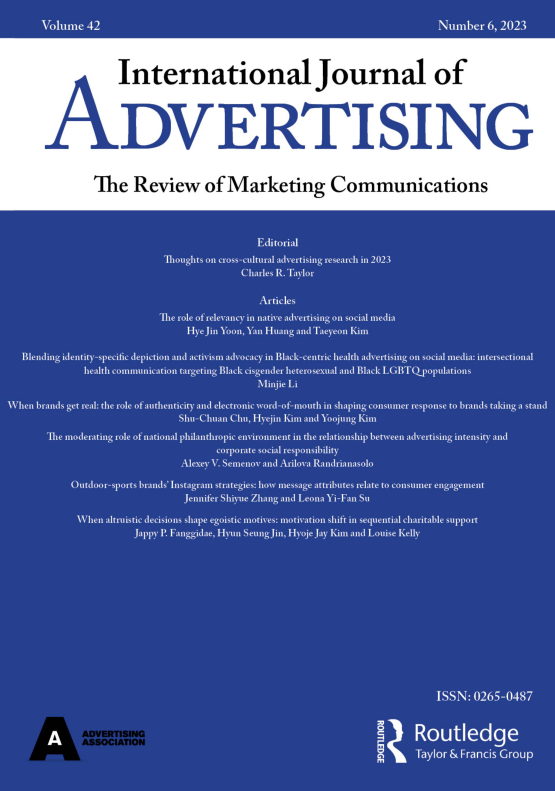Submit a Manuscript to the Journal
International Journal of Advertising
For a Special Issue on
New Evidence and Perspectives on Media Planning
Manuscript deadline

Special Issue Editor(s)
Rachel Kennedy,
Ehrenberg-Bass Institute for Marketing Science, University of South Australia
Rachel.Kennedy@marketingscience.info
Nicole Hartnett,
Ehrenberg-Bass Institute for Marketing Science, University of South Australia
Nicole.Hartnett@marketingscience.info
New Evidence and Perspectives on Media Planning
Media is a significant investment for many firms and is expected to contribute to brand growth, or at least brand maintenance. It also underpins social and political campaigns affecting every household.
Advertisers, often partnered with agencies, must decide where, when, and how often to communicate with audiences, across the many media options that are available. Those decision-makers are increasingly expected to demonstrate the effectiveness and/or efficiency of media selections and laydowns to achieve marketing and broader business objectives (e.g., recently discussed by Marc Pritchard, CMO P&G). Impartial, evidence-based principles can help to inform decisions for improved outcomes. Academic research and review brings objective, analytic rigour that is valued when connected with industry needs and well communicated (see Ang, et al. 2023; Nyilasy and Reid 2007).
Given the enormous change in the global media environment, coupled with calls for more media-focused research (see Taylor 2024; Koslow and Stewart 2022), it is timely to revisit fundamental media knowledge, principles and practices, and extensively document evidence relevant to media planning. This special issue will look to comprehensively cover a range of topics related to media planning, buying and evaluation, as well as investigations into different media types (e.g., television, streaming video/audio, outdoor, social media, print, cinema, and radio).
Empirical and conceptual works are welcome. Priority will be given to submissions that provide practical knowledge for effective media use now and into the future.
Key topics of interest include but are not strictly limited to:
- Effectiveness of competing media strategies and tactics (e.g., targeting, scheduling, continuity, recency, addressable media) across different conditions (e.g., services vs durables, emerging vs developed markets);
- Media selection and performance, looking at different media and channel choices, and any combinations;
- Media measurement, particularly cross-media, including validations or comparisons across measurement approaches (e.g., experiments, marketing mix modelling, single-source data, attention, biometrics);
- What metrics should be used across or in specific conditions (e.g., reach, frequency, impressions, engagement, conversions, ROI, attention);
- Media technologies, tools and automation, providing transparency to programmatic buying, algorithms and Artificial Intelligence (AI) applications in media;
- Best practice data usage (first, second and/or third-party data) for responsible media planning (e.g., ensuring privacy while leveraging consumer data);
- Applications for business-to-business media planning as an under-researched area;
- Approaches for setting media budgets and/or allocating spending across markets, brand and product portfolios, ideally linked to outcomes;
- How media planning and buying processes have evolved for brands and agencies;
- Evidence-based media theory, including managers’ mental models for media decision-making and/or consumer responses;
- Insights from newer or emerging media and technologies (e.g., retail media, influencers as media, connected TV); and
- Media trends and usage patterns (e.g., advertisers’ expenditures, audience behaviour, advertising formats and related interactions).
References
Ang, L., C. Buzeta, M. Hirose, M. J. C. Van Loggerenberg, G. Van Noort, R. Uribe and H. A. M. Voorveld. 2023. An international perspective of the academic-practitioner divide in advertising: An exploratory study into its causes and solutions. International Journal of Advertising 42, no 1: 181-200.
Koslow, S. and D. W. Stewart. 2022. Message and media: The future of advertising research and practice in a digital environment. International Journal of Advertising 41, no 5: 827-49.
Nyilasy, G. and L.N. Reid. 2007. The academician-practitioner gap in advertising. International Journal of Advertising 26, no 4: 425-45.
Taylor, C. R. 2024. How much do attention levels in advertising matter? A call for more research. International Journal of Advertising 43, no 8, 1313-14.
Submission Instructions
Manuscripts submitted to the special issue should be original contributions and should not be under consideration for any other publication at the same time.
Manuscripts should be submitted in Times New Roman 12-point font, double-spaced with one-inch margins. Full manuscript submissions should have page numbers and be limited to 20 pages of text in length. The manuscript’s title page should include the corresponding author’s name, affiliation, mailing address, telephone number, and e-mail address. Names and contact information for other authors should be included as well. Information identifying the submission authors should only be listed on the title page.
All manuscripts should be submitted through the IJA online editorial management system at http://www.edmgr.com/i-j-a/default.aspx, during the period of April 1, 2025 through October 15, 2025. Authors should select “Special Issue: New Evidence and Perspectives on Media Planning” as the “Article Type”. Please also note in the cover letter that the submission is for the Special Issue on New Evidence and Perspectives on Media Planning. Manuscripts will go through a double-blind peer review process, and the Special Issue is planned to appear in 2026.

